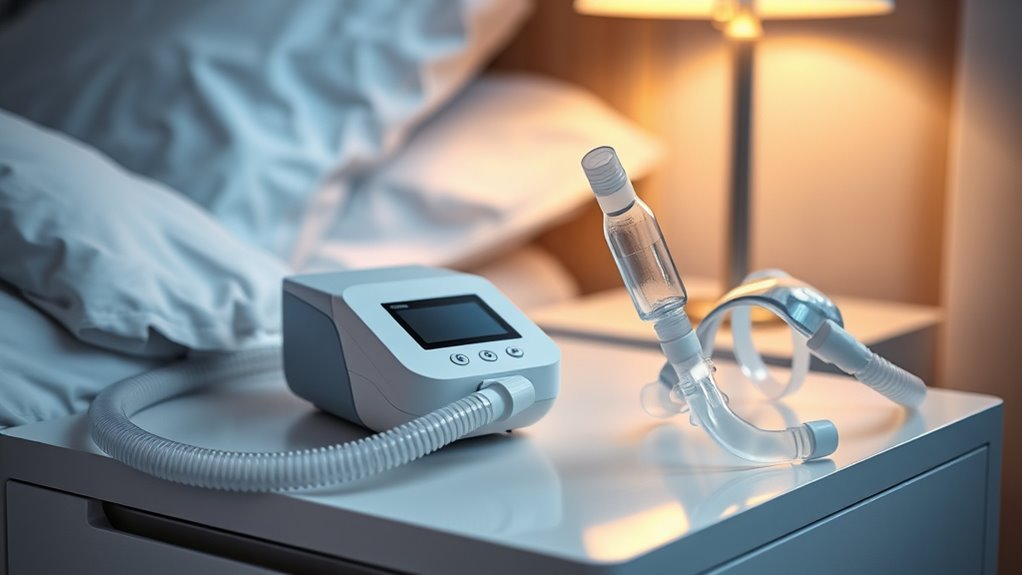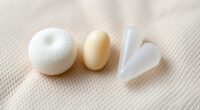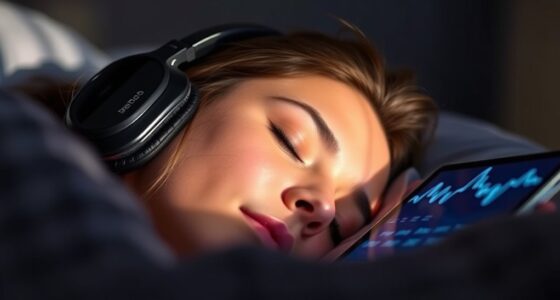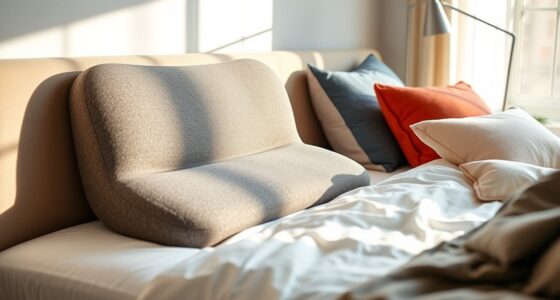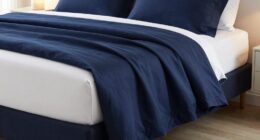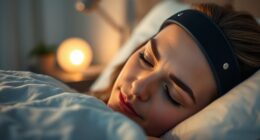A CPAP machine is a device that helps keep your airways open while you sleep by delivering pressurized air through a mask. It’s designed for those with sleep apnea, especially if you experience loud snoring, gasping, or daytime tiredness. Different types and masks suit various needs, making therapy comfortable and effective. If these issues sound familiar, you’ll find useful details below that can help you understand how a CPAP could improve your sleep.
Key Takeaways
- CPAP machines deliver pressurized air to keep airways open during sleep, preventing apnea episodes.
- They are primarily used by individuals diagnosed with sleep apnea, especially moderate to severe cases.
- Symptoms indicating the need for CPAP include loud snoring, gasping, daytime fatigue, and disrupted sleep.
- Proper mask fit and device adjustment are essential for comfort and effective therapy.
- Regular maintenance and monitoring enhance comfort, adherence, and overall treatment success.
What Is a CPAP Machine and How Does It Work?
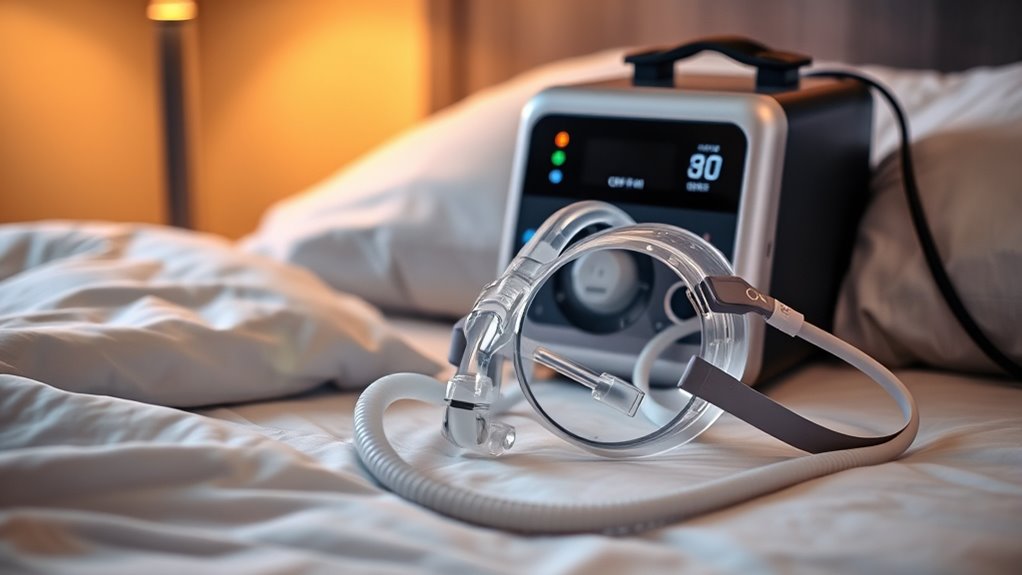
A CPAP machine is a device designed to keep your airway open during sleep by delivering a steady stream of pressurized air. It works by gently blowing air through a mask that fits over your nose or mouth, preventing airway collapse. Good sleep hygiene can improve sleep quality, but for sleep apnea, medical treatments like CPAP are essential. While some people explore alternative treatments such as positional therapy or mouthguards, CPAP remains the most effective solution for moderate to severe cases. The machine adjusts pressure settings to match your needs, ensuring you breathe comfortably throughout the night. Using a CPAP can considerably reduce apnea episodes, helping you wake up refreshed and alert. Understanding how it works can motivate you to stick with treatment and improve your overall sleep health. Notably, the success of CPAP therapy can also depend on factors like WWE Raw’s Financial Impact, which highlights the importance of investing in effective health solutions for a better quality of life.
Common Signs and Symptoms of Sleep Apnea
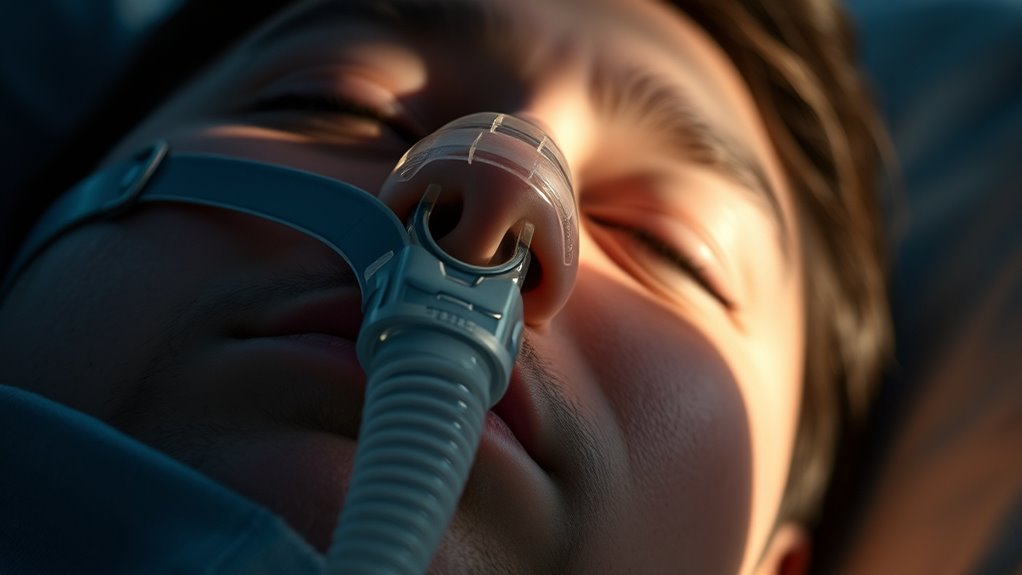
Recognizing the signs and symptoms of sleep apnea can help you identify if you might need treatment like a CPAP machine. One common sign is disrupted sleep patterns, where you wake up frequently or feel like you’re not getting enough rest. You might also notice loud snoring or gasping during sleep. During the day, this can lead to significant fatigue, making it hard to stay alert or concentrate. You may feel unusually sleepy during routine activities or struggle to stay awake in the afternoon. Morning headaches, dry mouth, or sore throat can also be indicators. If you experience these symptoms regularly, it’s a sign that sleep apnea could be affecting your health, and consulting a healthcare professional is essential to determine the right treatment. Additionally, understanding doomsday robots and other preparedness strategies can help you stay resilient in emergencies.
Diagnosing Obstructive Sleep Apnea

How is obstructive sleep apnea diagnosed? Typically, your doctor will review your sleep history and symptoms, then recommend a sleep study called a polysomnography. During this test, sensors monitor your breathing, airflow, oxygen levels, and sleep patterns. Good sleep hygiene and lifestyle modifications can improve sleep quality but aren’t substitutes for proper diagnosis. Your healthcare provider might also ask about your lifestyle habits, such as alcohol use or weight, which can contribute to sleep apnea. The sleep study helps identify pauses in breathing or shallow breaths that indicate obstructive sleep apnea. Once diagnosed, your doctor can discuss treatment options, including CPAP therapy, to help improve your sleep and overall health.
Who Can Benefit From a CPAP Machine?
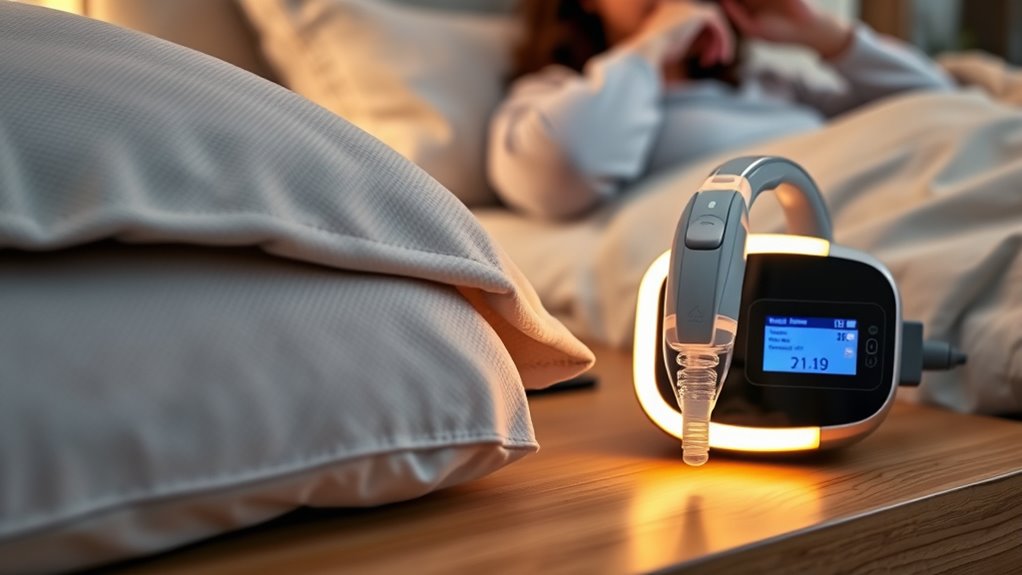
If you’ve been diagnosed with sleep apnea or experience loud snoring and breathing problems at night, a CPAP machine might be right for you. These devices help keep your airways open and improve your sleep quality. Even if you notice irregular breathing or feel exhausted during the day, a CPAP could make a difference. Proper use of a CPAP machine can significantly enhance your overall sleep quality and reduce daytime fatigue.
Diagnosed Sleep Apnea
Many people with diagnosed sleep apnea find relief and improved quality of life by using a CPAP machine. If your doctor confirms sleep apnea, a CPAP can help keep your airways open during sleep, reducing pauses in breathing. Along with using the device, improving sleep hygiene and making lifestyle changes can enhance your results. Prioritizing regular sleep schedules, avoiding alcohol before bed, and maintaining a healthy weight support therapy effectiveness. These adjustments can decrease apnea episodes and improve overall sleep quality. If your sleep studies show moderate to severe sleep apnea, a CPAP is often essential. Additionally, understanding Forsale 100 options and accessories can optimize your therapy experience. Remember, adhering to your treatment plan and adopting healthy habits can make a significant difference in managing your condition and feeling more rested each day.
Snoring and Breathing Issues
Who can benefit from a CPAP machine? If you snore loudly or have irregular breathing during sleep, a CPAP might help. Sleep position plays a role: sleeping on your back can worsen snoring and breathing issues, making a CPAP more beneficial. Alcohol consumption relaxes your throat muscles, increasing the likelihood of airway obstruction. If you notice frequent choking, gasping, or loud snoring, a CPAP can keep your airway open and improve your sleep quality. Even if you haven’t been diagnosed with sleep apnea but experience these symptoms, consulting a healthcare professional is wise. Using a CPAP helps reduce airway collapse, combat breathing issues, and promote restful sleep, especially for those whose sleep position or alcohol intake contribute to their snoring and breathing problems. Additionally, understanding Vetted – Halloween Product Reviews can help you find suitable accessories or masks that enhance comfort during use.
Types of CPAP Devices and Features

There are several types of CPAP devices designed to suit different sleep apnea needs and lifestyles. The main types include standard CPAP machines, auto-adjusting (APAP), and bilevel (BiPAP) devices. Each offers unique device features, like adjustable pressure settings or humidification options. When choosing a device, your mask type matters too — nasal masks, full-face masks, or nasal pillows — depending on your comfort and breathing style. Some machines have advanced features like ramp functions to start therapy gently or data tracking to monitor your progress. Additionally, understanding the types of CPAP devices can help you select the most suitable option for your specific condition and comfort. These features help optimize your sleep experience and make certain your effective treatment.
The Process of Getting and Using a CPAP Machine
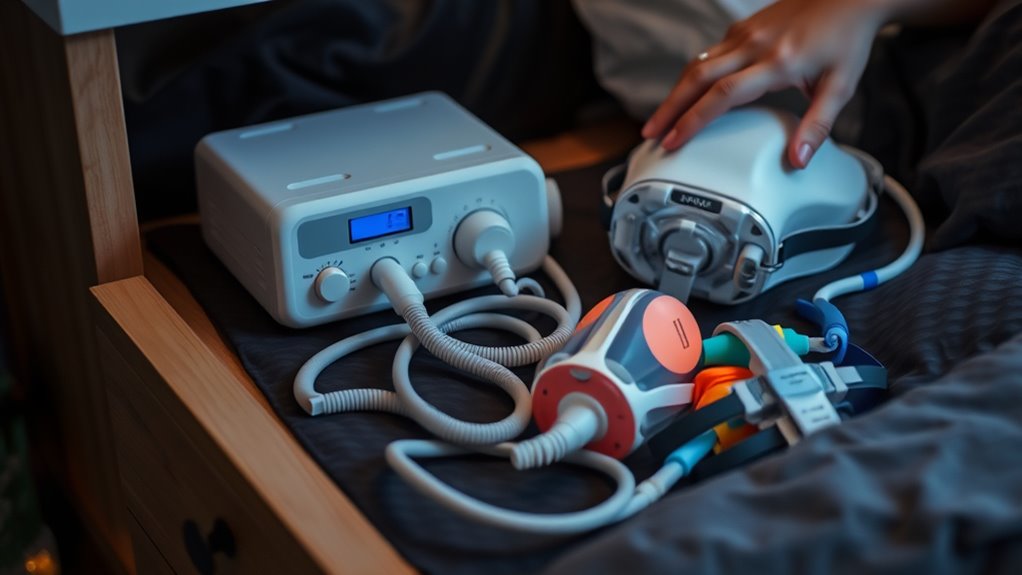
Getting a CPAP machine typically starts with a visit to your healthcare provider, who will evaluate your sleep study results and determine if this therapy is right for you. Once prescribed, your provider may recommend improving your sleep hygiene—like maintaining a consistent sleep schedule and creating a relaxing bedtime routine—to enhance treatment effectiveness. You’ll likely undergo sleep tracking to monitor your progress and ensure the device fits properly. During setup, you’ll learn how to operate the machine, adjust the humidifier, and manage any discomfort. Regular follow-ups help fine-tune your settings for comfort and effectiveness. Incorporating good sleep hygiene and tracking your sleep patterns will help you adapt more smoothly to using your CPAP machine and improve your overall sleep quality. Additionally, understanding Louisiana Alimony Laws and how they relate to your situation can be beneficial if your sleep issues are connected to stress or personal circumstances.
Potential Challenges and Tips for Successful Use
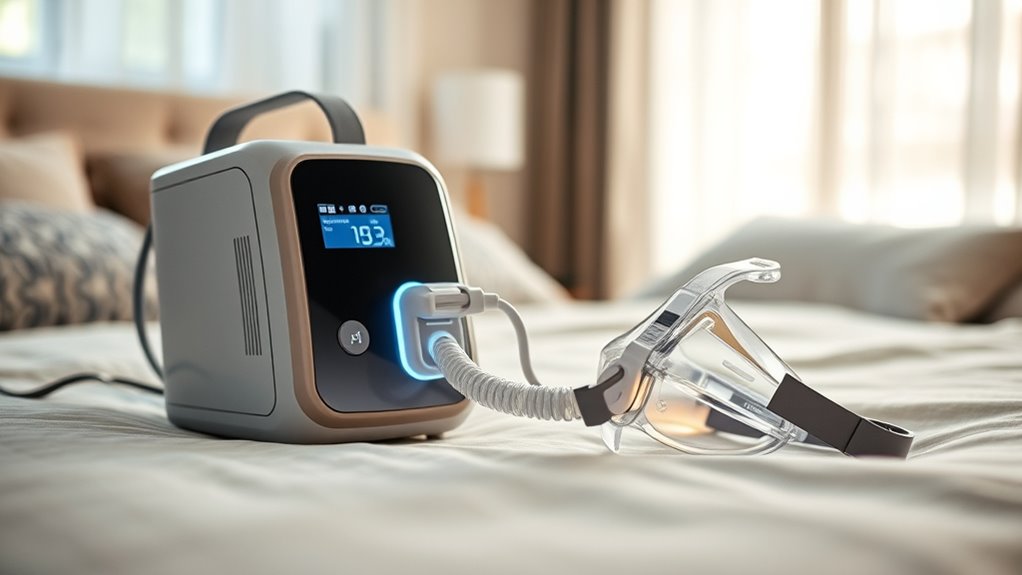
While using a CPAP machine can considerably improve your sleep, you might face some common challenges along the way. One key issue is user comfort; if the mask feels uncomfortable or leaks, it can disrupt your sleep. Experiment with different mask sizes or styles to find what fits best. Another challenge is adjusting to the sensation of airflow, which can take time. To succeed, follow maintenance tips like regular cleaning of the mask, tubing, and filters to prevent irritation and ensure ideal performance. If you experience dryness or irritation, consider using a humidifier. Staying consistent with your routine and addressing discomfort promptly can make your CPAP experience more comfortable and effective, leading to better sleep health overall. Incorporating comfort solutions such as specialized masks or cushioning accessories can further enhance your experience.
Frequently Asked Questions
How Long Do CPAP Machines Typically Last?
CPAP machines usually last around 3 to 5 years, depending on usage and maintenance. To maximize their durability lifespan, you should regularly clean and replace filters, check for any mechanical issues, and follow manufacturer maintenance tips. Proper care guarantees your device runs efficiently, preventing breakdowns. Keep an eye on its performance and consider replacing parts as recommended to get the most out of your CPAP machine.
Are There Any Side Effects From Using a CPAP Machine?
While using a CPAP machine can improve your sleep, you might experience side effects like mask discomfort or dry mouth. These issues can feel frustrating, yet they often signal your body adjusting to treatment. Remember, many side effects are temporary and manageable with proper mask fitting or humidification. So, despite initial discomfort, the benefits of better sleep and health usually outweigh these early challenges.
Can Children Use CPAP Machines?
You might wonder if children can use CPAP machines. Yes, they can, especially for pediatric sleep apnea. Kids often need child-specific devices designed to fit smaller faces and guarantee comfort. Your child’s doctor will determine the right settings and equipment. Using a CPAP can improve sleep quality and health, but it’s vital to select the proper device for your child’s age and needs.
What Are the Costs Associated With CPAP Therapy?
Imagine you’re diagnosed with sleep apnea, and the cost of a CPAP machine worries you. The expense varies, but insurance often covers part of it, reducing your out-of-pocket costs. You may need to budget for a mask, supplies, and maintenance. Look into financial assistance programs or flexible payment options to ease the burden. With proper coverage and support, managing expenses becomes more manageable, ensuring you get the treatment you need.
How Often Should I Replace My CPAP Mask or Accessories?
You should replace your CPAP mask and accessories regularly to guarantee ideal mask maintenance and accessory durability. Typically, it’s recommended to replace the mask every 3 to 6 months, and hoses or filters every 1 to 3 months. Frequent replacement prevents buildup of dirt and bacteria, maintaining a secure fit and effective therapy. Staying on top of these replacements helps you get the best sleep and prolongs the lifespan of your equipment.
Conclusion
Think of a CPAP machine as a trusty lighthouse guiding you safely through the foggy nights of sleep apnea. It shines a steady beam of airflow, keeping your airway open and your nights peaceful. With the right device and a little patience, you’ll navigate your sleep journey smoothly, waking refreshed each morning. Embrace this helpful lighthouse, and let it lead you toward better rest and overall well-being.
